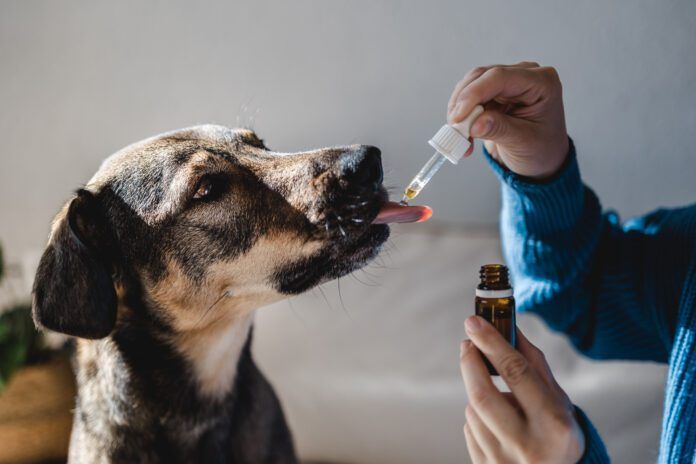Hemp products for dogs are bestsellers, with sales approaching $1 billion per year. Although they have been shown to help reduce physical pain and treat anxiety in dogs and humans, hemp products are controversial as well as confusing.
The key to understanding this booming market lies in distinguishing hemp from marijuana and recognizing the differences between hemp seed oil and CBD oil. From nutritional supplements to calming treats and topical sprays, hemp-derived products vary widely in quality, composition, and effectiveness. As the science and regulation of these products continue to evolve, pet owners must navigate a complex landscape of claims and labeling to find safe, reliable options for their dogs.
Hemp vs. Marijuana
Marijuana is a Schedule 1 controlled substance under the Controlled Substances Act, making its sale and use illegal nationwide, but a confusing network of state laws legalize marijuana for medicinal or recreational purposes.
Hemp and marijuana come from the same plant, Cannabis sativa, but they have different legal definitions depending on how much tetrahydrocannabinol (THC)— the psychoactive ingredient in marijuana—they contain. In in the U.S., the federal definition of marijuana is a concentration of THC above 0.3%. Ingesting products containing significant amounts of THC can be harmful to dogs.
Products containing less than 0.3% THC are considered safe for human and animal consumption, though state regulations vary. The most restrictive state laws are seldom enforced, so low-THC products for human and animal use are sold nationwide.
Hemp, which has little or no THC, has been used for centuries to produce oil used in ink, paint, varnish, lamp oil, and cooking as well as fiber for rope and fabrics. Hemp oil is cold-pressed or chemically extracted from the hemp plant.
What Are Cannabinoids and How Do They Affect Dogs?
Cannabinoids are naturally occurring chemicals in hemp that interact with receptors in human and animal bodies to regulate mood, memory, appetite, and pain, affecting the central nervous and immune systems. There are over 100 cannabinoids in hemp, including CBD (cannabidiol, which is the most widely used), CBC (cannabichromene), CBDA (cannabidiolic acid), and CBG (cannabigerol). Alone and in combinations, these cannabinoids have been shown to reduce pain, stress, and anxiety in dogs as well as humans.
Is Hemp Seed Oil the Same as CBD Oil?
While both hemp seed oil and CBD oil may be referred to broadly as “hemp oil,” they are different products. CBD oil is made from the stems, leaves, and flowers of the hemp plant. Hemp seed oil is pressed or extracted from the seeds of hemp plants. It does not contain CBD.
Benefits of Hemp Seed Oil for Dogs
Hemp seed oil’s health benefits for dogs come from its ratio of omega-6 to omega-3 fatty acids and its ability to improve skin, reduce blood pressure, promote heart health, and reduce painful inflammation.
Pure 100% hemp seed oil is sold as a food for humans, such as Foods Alive Organic Hemp Seed Oil and Indian Foods Organic Hemp Seed Oil.
Products labeled as hemp seed oil for dogs and other pets seldom contain the oil by itself. Instead, they are usually combinations of hemp seed oil and calming herbs like chamomile, calming supplements like melatonin, nutritional supplements like vitamins, or other oils such as krill, salmon, or flaxseed.
For example, Good Growlies Calming Hemp Treats contain hemp seed powder, hemp seed oil, melatonin, valerian root, chamomile, passion flower, and L-tryptophan, all of which have proven calming effects. Natural Dog Company’s Calming Oil contains similar ingredients. NaturVet Hemp Advanced Joint Health Chews combine hemp seed powder and hemp seed oil with collagen, chondroitin sulfate, green lipped mussels, yucca, and other anti-inflammatory ingredients. Petkin HEMP Itch Spray treats hot spots and itchy skin with THC-free hemp oil, lavender extract, menthol, organic oat extract, aloe, and vitamin E.
CBD for Dogs
While research into the effects (and effectiveness) of CBD on dogs is becoming more common, completed studies and clinical trials are still hard to come by. CBD is thought to be useful for controlling pain, nausea, anxiety, depression, and seizure activity. It has also been shown to have anti-inflammatory properties.
For more information see these articles:
- How to Choose CBD For Dogs
- Know Your CBDs
- What Canine Conditions Can CBD Treat Successfully?
- Which Dogs Should Not Receive CBD?
Side Effects of CBD for Dogs
There are no guarantees about how CBD will act in an individual body because every dog’s response is unique. CBD appears to be safe at many times the recommended dosage for brief periods and at recommended doses for longer periods, but again, reactions vary.
Reduce or stop using CBD if your dog shows side effects such as:
- Dramatic drowsiness
- Gastrointestinal symptoms
- Physical discomfort
- Agitation
CBD Product Dosages for Dogs
Most CBD labels suggest a starting dose of 1 or 2 milligrams (mg) per 10 pounds of body weight directly on the tongue, in food, in a treat, or applied directly to the skin. A conservative approach is to use half the recommended amount for a first dose, as individual responses vary. Within an hour or two, your dog may show an obvious reaction, such as moving more easily or looking more relaxed. If not, experiment with 1 mg per 10 pounds of body weight for a low dose, 3 mg per 10 pounds of body weight for a medium dose, and 5 mg per 10 pounds of body weight for a stronger dose.
If your dog doesn’t show any reaction at all, increase the dose next time. In general, chronic issues respond well with long-term, steady, lower quantities over time, while situational stresses can respond to higher quantities in a short time. A dog who has overdone it and is in pain or discomfort could benefit from a short-term dose that’s double or triple product’s label recommendation.
Low-strength doses of CBD support sleep and general wellness while higher-strength doses may help with pain, inflammation, anxiety, aggression, and reactions to fireworks, thunder, and other loud noises. Many veterinarians recommend staying with an introductory dose for 3 to 5 days before gradually increasing the amount.
Finding Reliable Hemp Oil Products for Dogs
Hemp of dogs and other hemp-derived products vary in quality and potency. Tests conducted by the U.S. Food and Drug Administration and other organizations confirm that inaccurate label claims, incorrect CBD quantities, and product quality problems are widespread. Most of the information available to dog owners comes from advertising claims and product labels.
“Buyer beware” is sensible advice in this market.
The first step in finding a reliable product for your pup is to learn about different manufacturers and focus on those who clearly describe their philosophy, history, raw material sourcing, products, and use instructions. If your veterinarian has experience with CBD products, ask for recommendations. To help pet owners, the Veterinary Cannabis Society offers a curated research library, collections of popular articles, and a directory of practitioners.
Look for third-party test results, which are chemical analyses resulting in Certificates of Analysis (COAs) from a laboratory not affiliated with the product’s manufacturer. Reliable manufacturers test every batch of every product for purity, safety, potency, and accurate labeling. In addition, the NASC or National Animal Supplement Council’s Quality Seal, USDA Organic Seal, and U.S. Hemp Authority Seal ensure that best manufacturing practices were followed in the product’s sourcing, production, and labeling.
Trends in Hemp Oil for Dogs and Other Cannabinoid Pet Products
In addition to hemp oil, popular hemp-derived products for dogs include tinctures, tablets, capsules, peanut butters, gummies, creams, biscuits, chews, toppers, powders, and oils. Most are oil-based, using hemp seed, camelina, coconut, avocado, or other vegetable oils. Most new products are edibles, but some are sprays or salves designed for topical application. Isolates are single cannabinoids, such as CBD, CBG, and CBC, and several products contain isolates that boost their effect on physical discomfort or anxiety.
Nanotechnology is the latest buzz word in CBD product manufacturing, along with water-soluble cannabinoids. For examples, see Super Snouts Hemp Company,
Arkos Bioscience CBD Pet Tincture, Science-Rite CBD Tincture for Dogs, and
American Shaman Water Soluble CBD Oil for Dogs. These rapidly absorbed products can be added to drinking water, dropped into a dog’s mouth, or mixed with food or treats.







Is it necessary for a dog to have both wet and kibble? I’ve been giving my dog wet foot in the morning and freeze dried for evening with chicken topper. Also is it alright to change different types of wet food.
Nothing seems to bother him I am just wondering if he needs kibble for teeth